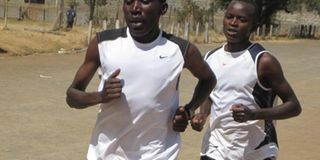Kenyan runners lose earnings and freedom to rogue agent in Korea

Francis Biwott (left) training at Nyahururu stadium recently. He accused an unnamed agent in Korea of exploiting Kenyan runners. PHOTO | DAVID MACHARIA |
What you need to know:
- Athletes coerced to share prize money 50-50 with the manager.
- Accusations made by athletes of forced menial work and confiscation of their Kenyan passports.
Francis Biwott was silently optimistic of claiming at least a podium finish when he left Kenya to compete at the Seoul marathon last month.
On arrival, the athlete however ended up watching the very race from the sidelines in disappointment, as compatriot Wilson Loyanae emerged the winner with an impressive time of 2:06.11.
Biwott, who finished second at the Tiberias marathon in 2012, says he failed to compete in Seoul after a disagreement with his facilitator on how to share the prize money.
He refused to sign an agreement that would enable him surrender 50 per cent of the Sh6 million prize money available had he won this race, a move he says would have left him with “almost nothing”.
“If I had allowed him to take the 50 percent and then the Korea tax body takes an additional 25 percent (of the prize money), the total deductions would have accumulated to 75 percent, a scenario I have never witnessed before,” Biwott told Nation Sport in Nyahururu.
And that’s not all.
Biwott adds that he found several other Kenyan runners in Seoul who compete under the representation of this same chap who is not even registered by Athletics Kenya as is required by the law governing the sport. Not that those athletes are treated any better.
Apart from competing almost monthly in several races in South Korea — a situation that burns them out at an early age, these athletes also have to contend with doing casual jobs — and still split the cut on their proceeds with the agent, according to the Nyandarua-based Biwott
“This situation is very unfortunate. The Kenyans have been turned to cheap labourers when they are not running the marathons,” Biwott said.
EXPLOITATION
He is now urging Athletics Kenya to stop this increasingly common vice of exploitation by the foreign “agents”.
But how did Biwott, as an experienced runner, with a personal best timing of 2:07:32, fall into this trap?
“A Nyahururu-based athlete told me that a team of 10 runners had been invited to run the Seoul marathon but one of the team members had indicated his unavailability at the last minute and so I replaced him,” he said. He later discovered that the Korean visa he got in Nairobi indicated he was a tourist.
The tourist visa is meant to avoid a situation where the embassy would demand a letter from AK.
The runner said he had already informed the Nyandarua Athletics sub branch about the matter.
The sub branch chairman, Francis Mwaniki, admits he received names of 10 athletes who were in Korea after leaving Kenya without the laid down procedure.
“We will take action after we gather details about the whole issue including the person in Nairobi who has been facilitating the runners to acquire visas,” Mwaniki said.
The Kenyans are paid $200 every month for running in the marathons and working for the Korean. But one has to have stayed in Korea for three uninterrupted months to qualify for the payments.
The man keeps the passports held by the Kenyan runners, Biwott said.




